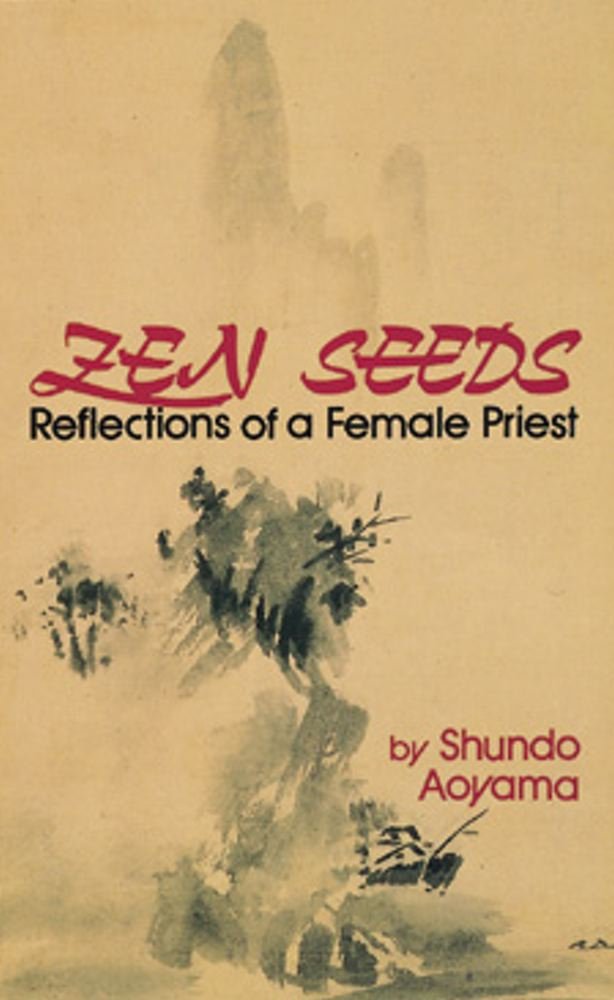Zen Seeds: Reflections of a Female Priest
By Shundo Aoyama. Translated by Patricia Daien Bennage.
Kosei Publishing Company: Tokyo, 1990.
162 pp. $5.95 (paperback).
The short chapters of Shundo Aoyama’s Zen Seeds: Reflections of a Female Priest resound in the mind like a temple bell. Modest and unassuming, she cuts through concepts and theories about Zen, bringing the reader back to ordinary experience as the source of spiritual wakening. Zen Seeds is less a manual of Zen practice than a guide for living a fully realized life. It reminds us of what we already know.
Drawing from Buddhist scripture, the writings of Zen master Dogen (1200-1253), talks by contemporary Zen masters, the work of haiku poets, and incidents in her own life, Aoyama addresses the dilemmas of daily life in and outside the monastery. She writes of a lay trainee’s bloody suicide attempt during a three-day zazen retreat; of a taxi driver’s despair at the seeming worthlessness of his profession; of her tea-ceremony students who have become mothers; of the death of her father; and of the master-disciple relationship.
We learn that Aoyama, now abbess of Muryo-ji and Aichi Semmon Niso-do, a Soto Zen training temple for women, was brought to Muryo-ji more than fifty years ago, at the age of five. Her aunt, Shuzan, who was chief priest there at the time, made no exceptions for the child. In the chapter entitled “My Two Teachers,” Aoyama describes those early years: “Shuzan, while she was really a warm person, was also strict. For 365 days of the year, she never permitted me to sleep late. We got up while it was still pitch dark outside to hold morning service.” On holidays she was allowed exactly one hour after lunch for play. “One time when I was out playing, I lost track of time and returned an hour late,” she recalls. “Shuzan poured a bucket of well water over my head and scolded me severely.” Even during high school, no deviation from the temple schedule was permitted.
Although the essential matter of this book transcends cultural categories, many of the references may strike American readers as quite foreign: the unquestioning adherence to strict discipline; the belief in oracles, demons, and hungry ghosts; and the language of devotion. Indeed, Aoyama seems to deify Shakyamuni Buddha, perhaps in an effort to reach readers accustomed to a Christian or Pure Land Buddhist approach. Still, the underlying message of Zen Seeds is that it is up to each of us to lead our lives in accordance with our inherently enlightened minds. “However well we understand that we manifest the life of the Buddha, we cannot realize our full potential unless we practice the Buddha’s teachings.”
Many of these chapters read as sermons, but Aoyama never pontificates, never presumes to be more advanced than her reader. And with a light yet rapier-sharp touch, she hints at the declining spiritual authority of the Zen establishment in Japan. “The priests of today seem like black clouds covering the sun,” she writes. In another place, she notes with abhorrence the physical brutality that constitutes discipline during the meditation retreats of certain temples.
Aoyama relates an experience of a very different kind that took place at a retreat she attended in 1966 at Antai-ji in Kyoto. There was no chanting of sutras, no dharma talk, no use of the so-called encouragement stick. There were no interviews between master and student; no one yelled at the beginners who were shifting about, nor scold those who were dozing off. At this kind of retreat, she writes, “There is not a single thing to distract one; there is no one to show off to. Yet it is impossible to sleep for five days. Your eyes open, even though you may not want them to, and you must come face-to-face with yourself.”
At the end of the retreat, the students proceeded in silence to the master’s quarters, where they all bowed and thanked him. “Continuing on, we went to the kitchen and bowed in gratitude to the old nun in charge of the meals. These rituals, in which a dynamic spirit was manifested in form, spontaneously unfolded one after the other. For a person like me who was used to empty religious practice, everything in these rituals was revealing, down to the most insignificant detail.”
It is from this kind of “real zazen, in which people must be led with true kindness,” that Zen Seeds emanates. The candor and humility with which she speaks of her “petty self that picks and chooses according to its own convenience,” the clarity and simplicity with which she communicates what it is to be a Buddhist monk or priest (“one must throw aside one’s robes and become involved in the world in order to weep, suffer, and laugh with other people”) are indeed refreshing.
Originally published in Japan in 1983, this first English edition was translated by Patricia Daien Bennage (now Daien Roshi), who recently returned to the United States after many years of Zen training in Japan.
Thank you for subscribing to Tricycle! As a nonprofit, we depend on readers like you to keep Buddhist teachings and practices widely available.
